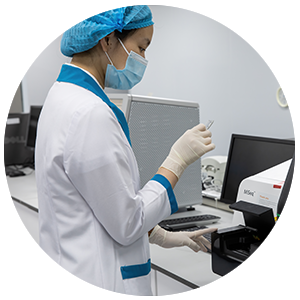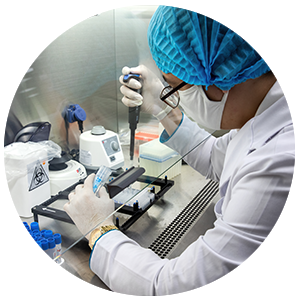Regular, affordable antibiotic treatment significantly reduces the risk of developing rheumatic heart disease in children and adolescents, according to a new study.
Rheumatic heart disease is an acute systemic (immune-related) inflammatory disease that occurs only after one or more episodes of pharyngitis caused by group A beta-hemolytic streptococcus according to the Lancefield classification. Within 2-3 weeks after streptococcus infection in the oropharynx, if not treated fully and properly, the disease can progress to rheumatic heart disease. The disease is manifested by a syndrome including: Polyarthritis, carditis, chorea, subcutaneous granulation, erythema ring. Rheumatic heart disease is common in children 5-15 years old, the incidence in men and women is equal. The disease can cause serious complications in the heart, joints, brain and skin. In the heart, rheumatic heart disease can leave long-term consequences such as carditis, thickening of the heart valve, leading to heart valve damage, arrhythmia, heart failure, stroke or even death.
.
Not all patients with group A beta-hemolytic streptococcus infection in the pharynx develop rheumatic heart disease, but only a small percentage develop rheumatic heart disease. Favorable factors for the disease include age (90% of cases of rheumatic heart disease occur in children 7-15 years old, mainly 9-12 years old, rarely in children under 5 years old), environmental factors (conditions). cold and humid conditions, so the disease often appears in winter and spring in tropical and temperate countries), atopic (common in children with allergic conditions such as urticaria, bronchial asthma, eczema...), living standards (the disease is common in areas with low living conditions, poor hygiene, economic difficulties, cramped houses, etc.)
.
Research conducted by the Murdoch Children's Research Institute (MCRI), the Uganda Heart Institute and the National Children's Hospital in Washington has shown that early screening is important in preventing and minimizing the progression of rheumatic heart disease. with serious conditions and death in young children.
.
Rheumatic heart disease affects 40.5 million people globally and causes at least 306 000 deaths each year. Previously, it was not established whether antibiotics were effective in stopping the progression of underlying rheumatic heart disease. According to Associate Professor Andrea Beaton - Cincinnati Children's Hospital (USA) said: "This trial is the first randomized controlled trial currently in rheumatic heart disease. The results are extremely important and demonstrate that high-quality clinical trials are feasible to address this cardiovascular disease.” The trial was conducted in 818 children in Uganda aged 5-17 and with underlying rheumatic heart disease. Participants will be divided into two groups, one group will receive Penicillin injections every 4 weeks for 2 years, the other group will not receive treatment. All had echocardiograms at the beginning and end of the trial. The trial reported that only three people (0.8%) in the Penicillin group had underlying progressive rheumatic heart disease, compared with 33 people (8.3%) in the untreated group.
.
“The results show that for every 13 children with underlying disease treated for two years, one more child was prevented from developing the disease rather than getting worse,” said Dr. Daniel Engelman of MCRI. This is an important finding that helps form strategies to prevent chronic and severe diseases. Professor Andrew Steer of MCRI said that screening for underlying rheumatic heart disease is important to help prevent progression of the disease due to damage to the heart valves - a damage that is largely untreatable. Because children with underlying rheumatic heart disease have no obvious symptoms and changes in the heart valves cannot be detected clinically. Currently, most patients are diagnosed when the disease has progressed to a severe stage and complications appear. This late diagnosis is associated with high mortality at a young age. Therefore, if detected early, it will help patients have the opportunity to intervene and improve their health.
.
In 2018, Uganda supported a World Health Organization resolution to make the condition a global priority. Dr. Emmy Okello - Uganda Heart Institute said: Our study shows that a cheap and easily available Penicillin can prevent the progression of underlying rheumatic heart disease to more severe valve damage - a phenomenon It is common in our hospitals that patients do not have the conditions to have heart valve surgery." This opens the way to increasing opportunities for low-cost treatment and reducing mortality rates for patients with this disease.
.
Editing and summary: Ngoc Anh - Phacogen Institute of Technology;
(Master in Experimental Biology. University of Natural Sciences - Hanoi National University)
Referral:
Andrea Beaton, Emmy Okello, Joselyn Rwebembera, Anneke Grobler, Daniel Engelman, Juliet Alepere, Lesley Canales, Jonathan Carapetis, Alyssa DeWyer, Peter Lwabi, Mariana Mirabel, Ana O. Mocumbi, Meghna Murali, Miriam Nakitto, Emma Ndagire, Maria C.P. Nunes, Isaac O. Omara, Rachel Sarnacki, Amy Scheel, Nigel Wilson, Meghan Zimmerman, Liesl Zühlke, Ganesan Karthikeyan, Craig A. Sable, Andrew C. Steer. Secondary Antibiotic Prophylaxis for Latent Rheumatic Heart Disease. New England Journal of Medicine, 2021; DOI: 10.1056/NEJMoa2102074
Source of article
https://www.sciencedaily.com/releases/2021/11/211113181402.htm
https://www.vinmec.com/vi/tim-mach/thong-tin-suc-khoe/benh-thap-tim-la-benh-gi-dac-diem-cua-benh/





